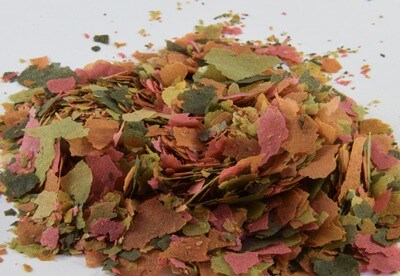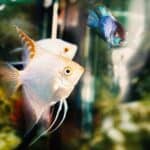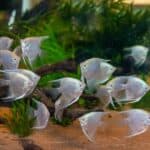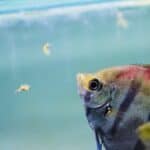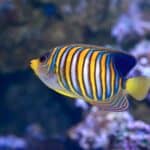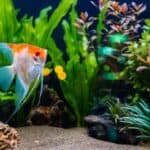Fish flakes provide essential vitamins, minerals, and nutrients that fish need to thrive. The question is, do angelfish eat flakes, or are there other food sources that are preferable?
Angelfish eat fish flakes because they’re flavorful and nutritious. Fish flakes contain high levels of protein, which angelfish need more of than other species. They also contain vitamins A, C, D, E, and K. Tropical fish flakes are healthiest for angelfish because they contain all the nutrients they need.
Fish owners like flakes due to their affordable price and convenience, but it’s essential to understand the health benefits before you feed them to angelfish.
Will Angelfish Eat Flake Food?
In captivity, most angelfish will readily eat fish flakes, especially if they’re hungry. Flakes and pellets make up the bulk of an angelfish’s diet, as they contain all the protein and nutrients they need.
They’re also made with meat and fish, meaning the smell attracts omnivorous angelfish and entices them to eat the flakes.
However, fish flakes aren’t a natural food for angelfish. They’re intended to contain the essential nutrients and minerals angelfish would seek in the wild.
Some angelfish may take longer than others to adapt to fish food and require hand-feeding to get them used to the flakes.
When angelfish are solely fed flakes, they’re at risk of boredom.
Angelfish require mental stimulation to keep their minds healthy and active, especially if there are few plants in the tank for them to play with.
Bored and stressed angelfish show the following symptoms:
- Gasping at the surface
- Decreased appetite
- Diseases, such as ich
- Poor scale quality
- Altered swimming patterns
Diet has a large part to play in angelfishs’ health and wellbeing, so make meals as varied as possible.
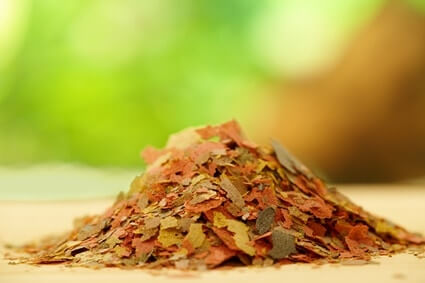
Are Fish Flakes Good For Angelfish?
As already mentioned, flakes are the most common food option for fish. They can be fed whole or crushed, depending on where your angelfish like to eat within the tank.
There are also several varieties of fish flakes available, each containing different ingredients to suit your aquarium. As a result, fish flakes are a good source of nutrients and include the following:
Protein
Angelfish require a high-protein diet that contains plenty of iron and amino acids. Juveniles up to nine months should aim for 50% protein, whereas adult angelfish need between 35-40%.
As described by a journal from the Department of Animal Biology, protein allows angelfish to obtain essential amino acids, synthesizing new proteins or replacing existing ones.
A lack of protein increases an angelfish’s risk of stunted growth and malnourishment. It also makes them weak and lethargic.
Fat
While angelfish don’t need lots of fat in their diet, they do need some, as they use it as energy. Angelfish also have fat stores throughout their bodies. If the water gets too cold, they use the stored fat for energy, keeping them warm and allowing them to survive until the water heats up.
Fat also contains dozens of fatty acids called lipids, which all play a crucial role in keeping your angelfish healthy. In particular, polyunsaturated fats (oils) are the easiest to digest and are useful for breeding fish.
Restrict your angelfish’s daily fat intake to 8-10%, which is enough for their everyday requirements.
Vitamins
Like all living creatures, angelfish need vitamins. Good-quality fish flakes should contain adequate levels of vitamin A, C, D, E, and K. All are essential for your angelfish’s health and strength for the following reasons:
- Vitamin A: Helps form healthy bones and scales, as well as overall growth and development.
- Vitamin C: Helps to prevent disease and speed up the healing process. It also improves digestion and helps to form the fish’s skeleton properly.
- Vitamin D: This vitamin metabolizes calcium and phosphorous, which are essential for healthy scales and bones.
- Vitamin E: Protects against cell damage and maintains a healthy immune system.
- Vitamin K: Helps to coagulate the blood.
As a result, look for fish flakes that contain all of these minerals (and more).
Are Fish Flakes Bad For Angelfish?
Flakes are only unhealthy if they’re overfed to angelfish. When angelfish are allowed to overeat, they’re at risk of developing obesity and fatty liver disease, both of which reduce the fish’s quality of life and cause early death. Signs that you’re overfeeding your angelfish flakes include:
- Rapid weight gain
- A bulging liver
- Lethargy
- Cloudy tank water
- Red eyes from ammonia poisoning
Also, too much protein causes problems. Excess protein is excreted as ammonia, which causes the chemical’s levels to rise to harmful levels while tainting the water’s quality.
When the ammonia gets too high, fish are at risk of poisoning, killing them, or making them seriously unwell.
The biggest downside to flakes is that they lose their nutrients quickly. This is because they dissolve in the water.
If you have any slow-eating angelfish in the tank, they’re at risk of deficiencies if they allow the flakes to dissolve before they go in for a bite. In this case, pellets or live food might be a better option.
Do Angelfish Eat Tropical Flakes?
As tropical fish that predominantly come from South America, high-quality tropical flakes are ideal for angelfish, as they provide all the nutrients found in their natural diet.
Tropical flakes tend to have a higher protein content than brands that cater to herbivorous fish. They’re also packed with vitamins and minerals they could get from food sources in their natural habitat.
It’s important to remember when choosing fish flakes that not all fish are created the same, and different species have different nutritional requirements.
This is why it’s crucial to choose tropical fish flakes containing the necessary ingredients to help your angelfish thrive. Supplementing tropical flakes with other varieties leaves angelfish vulnerable to malnutrition and health conditions.
Can Angelfish Eat Goldfish Flakes?
It’s safe for angelfish to eat goldfish flakes as a short-term substitute when you can’t find or get hold of tropical fish flakes. Both goldfish and angelfish are omnivores, requiring a diet of both meat and plant matter.
Both fish species eat similar foods, including shrimp, worms, and mosquito larvae. However, goldfish flakes have a higher level of vegetables than tropical flakes. They also have less protein, which angelfish need higher quantities of than goldfish.
As a result, angelfish are at risk of long-term health problems and nutrient deficiencies if they’re fed goldfish flakes for prolonged periods.
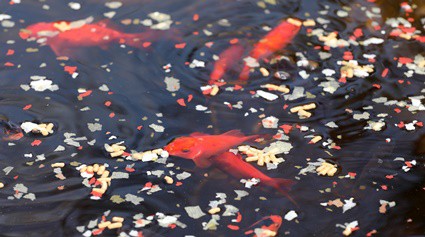
Best Flake Food For Angelfish
As we’ve already highlighted, tropical fish flakes are the most suitable for angelfish.
When looking for the best flake food for freshwater angelfish, study the ingredients list carefully. This indicates whether the food is healthy or packed with unnecessary ingredients designed to bulk out the content.
While reading the ingredients, look for what’s listed first, as this shows that they’re available in the largest amounts. Fish flakes should be high in protein, so protein-rich foods should feature high on the list.
The healthiest forms of protein come from other fish, such a shrimp and other seafood, which wild angelfish hunt and eat.
Similarly, avoid fish flakes that contain too many carbohydrates or grains. Excess carbs get excreted out as waste, tainting the tank water’s quality and causing ecosystem problems. As described by MSD Veterinary Manual, carbs also lead to fatty liver disease in high quantities.
Because flake foods oxidize once the tub is opened and exposed to air, they quickly lose their nutrients. Keeping them in the fridge or freezer prolongs their life, but try to use the contents up in a month to prevent them from going past their best.
How Often To Feed Angelfish Flakes?
Juvenile angelfish need flakes 3-4 times a day while their bodies are growing and developing. In contrast, adult angelfish require feeding 2-3 times a day, depending on their preferred schedule and size.
During each feed, put enough flakes in the tank for each angelfish to eat in 30 seconds without stopping. You may also need to break the flakes into smaller pieces to prevent any eating difficulties.
You must monitor this carefully. As we’ve already mentioned, overfeeding causes a range of health problems.
Similarly, as already touched upon, uneaten, rotting food causes harmful chemicals in the water to rise to dangerous levels, putting your fish at risk of ammonia and nitrite poisoning.
If you notice any soggy flakes floating in the tank, scoop them out and remove them as soon as you can to prevent this.
Angelfish Won’t Eat Flake Food
If you have an angelfish that’s not eating flake food, it could be for several reasons. You must get to the bottom of why so that you can encourage your fish to eat and remain healthy. If not, the fish is at risk of starvation. If you’re experiencing this issue, the following tips will help:
More Varied Diet
Angelfish require a varied diet that incorporates fresh veggies and either live, frozen, or freeze-dried insects and worms.
If your angelfish is bored with its food, it will refuse to eat it. Mental stimulation is vital, and fish flakes aren’t the most exciting food for your fish to eat.
As a result, try to switch your angelfish’s diet up so that it’s not just getting fish flakes day after day.
You may also want to try adding liquid vitamin supplements to your fish’s tank to ensure they’re not suffering from deficiencies that are causing appetite loss.
Switch To Pellets
Your angelfish may be refusing its flakes because it doesn’t like the taste or texture. Not all angelfish take to flakes – some prefer pellets. This is heightened if the flakes are too large and challenging for angelfish to eat.
Sinking pellets are better for angelfish who prefer eating at the bottom of the tank. Flakes remain too close to the surface for shy fish, who miss out on all-important nutrients.
They’re also easier to eat, as angelfish can fit them in their mouths whole.
Check for Illnesses
Your angelfish’s refusal to eat fish flakes could be the sign of a larger health problem instead of a problem itself.
Appetite loss is a significant indication that fish are unwell. This could be due to several health conditions, including ick, fatty liver disease, ammonia poisoning, and velvet disease.
All of these conditions are likely to cause your angelfish to stop eating, either due to pain or discomfort. Observe for other symptoms and take your fish to an aquarium vet straight away for diagnosis and treatment.
You must feed your angelfish a balanced diet alongside flakes to prevent them from getting bored or sick of the same food. The best way to do this is to provide live food to hunt alongside their favorite fresh veggies.

